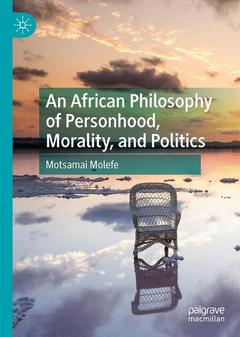An African Philosophy of Personhood, Morality, and Politics, 1st ed. 2019
Auteur : Molefe Motsamai

This book explores the salient ethical idea of personhood in African philosophy. It is a philosophical exposition that pursues the ethical and political consequences of the normative idea of personhood as a robust or even foundational ethical category. Personhood refers to the moral achievements of the moral agent usually captured in terms of a virtuous character, which have consequences for both morality and politics. The aim is not to argue for the plausibility of the ethical and political consequences of the idea of personhood. Rather, the book showcases some of the moral-political content and consequences of the account it presents.
1: Introduction
1.1: The Concepts of Personhood in African Philosophy
1.2: Developments in the Literature on Personhood
1.3: Themes and Structure of the Book
2: A Conceptual Mapping of Personhood
2.1: Introduction
2.2: Menkiti's Analysis of Personhood
2.3: Gyekye on Personhood
2.4: Matolino, Kaphagawani, and Ikuenobe on Personhood
2.5: Conclusion
3: An Exposition of Personhood as Moral Theory
3,1: Introduction
3.2: Being Human and Being a Person
3.3: Personhood Embodies a Character-Based Ethics
3.4: Means and Ends in Personhood
3.5: Humanism and the Instrumentality of Relationships
3.6: Rejection of Social Relationships as the Moral End
3.7: The Role of Relationships in Personhood
3.8: Conclusion
4: Personhood: Partiality or Impartiality
4.1: Introduction
4.2: Contextualising the debate Partiality and Impartiality in Moral Philosophy
4.3: Personhood: Partiality or Impartiality?
4.4: Conclusion
5: Personhood and Options in African Moral Thought
5.1: Introduction
5.2: Wiredu’s Approach to Moral Philosophy
5.3: Tshivhase’s Criticism of Personhood5.4: Conclusion
6: Personhood and Dignity in African Philosophy
6.1: Introduction
6.2: Ikuenobe’s Conception of Dignity
6.3: Personhood and Dignity
6.4: Personhood, Partiality and Dignity
6.5: The Young and the Marginal Cases, and Dignity
6.6: Conclusion
7: Personhood as a Political Theory of Duties
7.1: Introduction
7.2: The Idea of Rights
7.3: Menkiti and Two Conceptions of Personhood
7.4: The Minimalist Conception of Personhood and Rights
7.5: The Maximalist Conception of Personhood and Duties
7.6: Conclusion
Motsamai Molefe lectures at the University of the Witwatersrand, Johannesburg.
Offers a systematic exposition of personhood in African philosophy
Draws out the moral and political consequences of the normative conception of personhood
Written for scholars of African Philosophy
Date de parution : 04-2019
Ouvrage de 179 p.
14.8x21 cm



